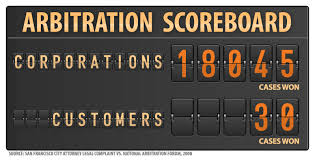Forced Arbitration Locks Consumers Out of Court
Hidden in the small print on the back of the standard form automotive contract is a paragraph of legalese called an arbitration clause. Translated into ordinary English, this pre-printed, non-negotiable language means California car buyers cannot use the public court system to sue a dealer for fraud, breach or contract or any number of legal claims. Also buried in the arbitration clause is a ban on being part of a class action, even where that form of action is really the only way to vindicate consumer rights. At the same time, the car dealer or a lender who funded the sale can just go ahead and sue the car buyer in court. You can read more about mandatory binding arbitration here.

When companies cannot be sued in court, they engage in fraud and deceptive practice with impunity. The arbitration clause written by corporate lawyers for their corporate clients has been referred to as a “Get Out of Jail Free” card. For this reason, Change.org refers to the arbitration clause as a “license to steal.”
Is that shocking? Is it unfair? Is it unconscionable? The California Supreme Court says, “No.” In a case called Sanchez v. Valencia Holding Company, LLC, earlier this month California’s highest court upheld the arbitration clause in the standard form automotive purchase contract used throughout California. Even as it acknowledged studies showing that almost no one subject to forced arbitration clauses knew that they banned access to the courts, the Court said the purchaser was stuck with the arbitration clause pre-printed on the backside of the contract.
The long-awaited decision is bad news for consumers, who are at a distinct disadvantage in the arbitration process. Statistics have shown that in arbitration generally, consumers win less than 5% of the time; and in some categories, even less than 1% of the time. Almost no ordinary person understands the implications of forced arbitration – i.e., not only that they are locked out of the public courts, but that the private system is rigged against them.
At the federal level, the Consumer Financial Protection Bureau is currently studying the issue of binding arbitration in certain consumer contracts. The CFPB is in the process, right now, of drafting a rule which could limit or even ban the use of arbitration clauses in consumer contracts. This rule could alter the effect of Sanchez v Valencia and restore Californians’ ability to use the court system to vindicate their consumer rights. You can help to cancel these corporate Get-Out-Of-Jail cards by adding your name to this petition. This is your chance to make your voice heard.

